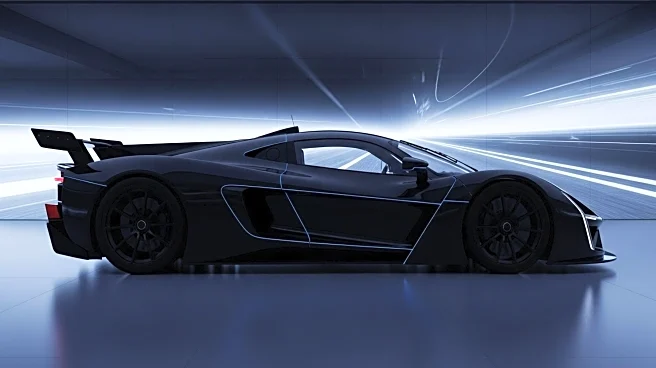What's Happening?
Japan's automotive industry has introduced a new hypercar, the Lexus LFR, which boasts 800 metric horsepower and is priced at $550,000. This vehicle is set to challenge European dominance in the high-performance car segment, traditionally led by brands like Ferrari and McLaren. The Lexus LFR features a twin-turbo V-8 hybrid system, providing immediate torque and endurance, marking a significant departure from its predecessor's V-10 engine. The hybridization of this hypercar reflects a broader trend in the automotive industry, where integrating hybrid technology is crucial for achieving peak performance. Lexus aims to re-enter the performance car arena with this model, succeeding the legendary LFA.
Why It's Important?
The introduction of the Lexus LFR signifies Japan's commitment to innovation and excellence in the automotive industry, challenging the status quo in the hypercar market. This move could shift the competitive landscape, as traditional European powerhouses face new competition from unexpected quarters. The hybrid approach offers a compelling alternative to electric vehicles, especially as some countries reconsider their commitment to EVs. The Lexus LFR's anticipated performance and elite status position it as a formidable competitor to other luxury automotive brands, potentially influencing consumer preferences and industry trends.
What's Next?
Lexus plans to debut the LFR model in 2027, with the automotive world closely watching its impact on the established order. As hybrid technology continues to evolve, traditional automotive powerhouses may need to respond to this new wave of competition. The success of the Lexus LFR could encourage other manufacturers to explore hybrid innovations, potentially leading to a broader shift in the industry towards hybrid performance vehicles.
Beyond the Headlines
The Lexus LFR's development highlights the ethical and environmental considerations of hybrid technology in high-performance vehicles. As the automotive industry grapples with sustainability challenges, the integration of hybrid systems in luxury cars could represent a significant step towards reducing emissions without compromising performance. This development may also influence cultural perceptions of Japanese engineering and innovation, reinforcing Japan's reputation as a leader in automotive excellence.









